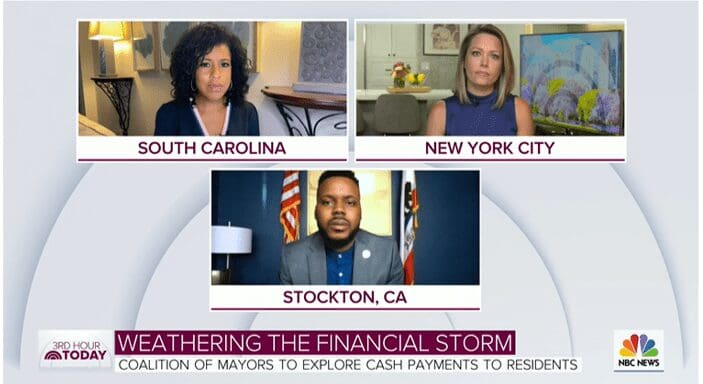By: Ben Kesslen —
Oakland Mayor Libby Schaaf said a guaranteed income is “probably the most powerful antidote for racial disparities” that she could enact.
Melvin Carter, the mayor of St. Paul, Minnesota, watched his city’s twin, Minneapolis, burn this spring as people gathered in protest and fury over the death of George Floyd and the treatment of Black people at the hands of police. Carter knew his city’s residents were aggrieved not only by decades of mistreatment, but also by the entrenched poverty that accompanied it.
“We have people in our community who work 60 hours a week and still scrape by to feed their children and pay their rent,” Carter said. “Whole neighborhoods that are in deep poverty and doing the best they can.”
A month before Floyd’s death May 25, Carter’s office had given 1,265 families one-time payments of $1,000 through a temporary program called the Bridge Fund. The emergency relief diminished some hardships, but it hasn’t been nearly enough. Carter wants a longer-term solution.
As the pandemic devastates the bank accounts of American families, mayors like Carter are proposing guaranteed income experiments, or universal basic income, as a simple, scalable and equitable solution for families and local economies.
The March stimulus package known as the CARES Act, they say, showed that giving cash directly to people works. The $1,200 checks from the federal government, along with the Paycheck Protection Program — which helped employers make their payrolls — and the $600 weekly unemployment assistance payments, kept many people afloat.
But the assistance was limited, and weekly checks expired at the end of July. In their absence, these mayors said, the need for universal income has become more urgent because it could help address racial disparities that COVID-19 has aggravated.
Led by Mayor Michael Tubbs of Stockton, California, a coalition of 16 city leaders from across the country in June launched Mayors for Guaranteed Income, an initiative to promote monthly checks. Los Angeles Mayor Eric Garcetti signed on, as did Atlanta Mayor Keisha Lance Bottoms, Seattle Mayor Jenny Durkan, Pittsburgh Mayor William Peduto and others. To see video of Mayor Stockton talks about UBI – blob:https://www.nbcnews.com/3f857b60-7f58-4515-9ce3-41bb6ff24819.
Tubbs said on NBC’s “TODAY” show in June that a guaranteed income is a step toward “abolishing poverty.” But the money, unlike a universal basic income, would go only to those in need, not to everyone regardless of wealth.
Stockton has been piloting a program for around 18 months, providing $500 a month to 125 people. During the pandemic, about 45 percent of that money went to food, Tubbs said. Much of the rest went to other essentials, like rent. While the mayors’ joint venture was in the works before the pandemic, they said the pandemic and the protests only strengthened their case.
Carter, who signed on to the initiative in June, said he believes it would help bridge the poverty gap permanently by providing direct, monthly cash payments to residents of his city in need every month. No strings attached.
An old idea with renewed attention
Universal basic income is a centuries-old idea that has long been floated but rarely implemented. The premise is simple: Give people money and trust them to use it for their needs. It has, in recent years, been taken out of economics theory papers and put to work in experiments in Kenya, Finland, Canada, Namibia and Brazil.




















